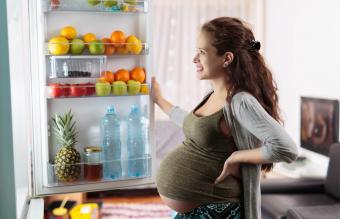
There is a lot of information to keep track of during pregnancy that can help keep you and your growing baby as safe as possible. Food consumption directly impacts your baby, so knowing which foods to avoid is a critical part of maintaining a healthy pregnancy.
Be Mindful of Food Safety in Pregnancy
Food safety is important to keep track of throughout your pregnancy. In being extra careful about what you consume you can help prevent harmful bacteria and viruses from food-related consumption from negatively impacting your growing little one.
1. Raw Meat and Seafood
Raw fish and sushi can contain parasites and harmful bacteria. Eating raw and under-cooked meat can also expose your fetus to potentially dangerous bacteria. Although cooked fish low in mercury can be a great asset to a healthy pregnancy diet, be mindful of any fish high in mercury. These tend to be fish that are on the larger side, so it's best to stick to salmon, herring, and trout.

2. Deli Meat and Cheeses
Deli meat and cheeses can potentially be contaminated with listeria. Listeria can cause a fever and uncomfortable symptoms during your pregnancy. Listeria is very dangerous for a developing fetus and can lead to infections, stillbirth and potentially a miscarriage.
3. Smoked Lox and Cured Jerky
Lox and jerky are cured products that may contain listeria. They both are not technically cooked, so if you have a craving for seafood or meat, opt for something cooked well.
4. Raw Eggs
Raw eggs may contain salmonella, a bacteria that can cause life-threatening problems for your fetus. Raw eggs may be found in salad dressing, mayo, home-made ice cream, and cookie dough. Just be sure to check the label if you're going for a store bought salad dressing, but most will be made with pasteurized eggs, which are safe to consume uncooked.

5. Pate
Pate can contain listeria. This includes vegetarian varieties as well, so it's best to avoid it in general. If you accidentally ingest pate, reach out to your healthcare provider as soon as possible.
6. Alcohol and Caffeine
Doctors tend to have different opinions on the amount of caffeine and alcohol okay to ingest during pregnancy. Since each person will process caffeine and alcohol differently, it's challenging to put an exact amount out there. If you want to err on the safe side, it's best to completely avoid these two substances if possible. If you are experiencing any caffeine or alcohol withdrawals, speak to your healthcare provider for support and assistance.

7. Unpasteurized Milk, Juice, and Cheese
Consuming unpasteurized milk, juice, and cheese can lead to the parasitic infection toxoplasmosis. This infection can cause serious harm to a growing fetus including leading to stillbirths, early labor, and potentially meningitis in newborns.
8. Unwashed Fruits and Veggies
Toxoplasma can also be found on fresh fruits and veggies. To avoid this parasite, be sure to thoroughly wash and scrub your fruits and veggies in hot water before consuming.

9. Raw Sprouts
Raw sprouts can be contaminated with E. coli, listeria, and salmonella. Raw sprouts include foods such as clover, bean sprouts, alfalfa, radishes, and fenugreek. If you want to consume sprouts, cook them very thoroughly until they are piping hot.
Understand Food Safety
Being pregnant is already challenging and there's a lot to keep track of from your appointments, to baby's growth and development, to the dos and don'ts that your doctor and friends and family will offer to you. To keep things as simple as possible, print a list of the foods that aren't safe for you to consume and leave it by your fridge or pantry. If you have any food safety questions, be sure to check in with your doctor.







